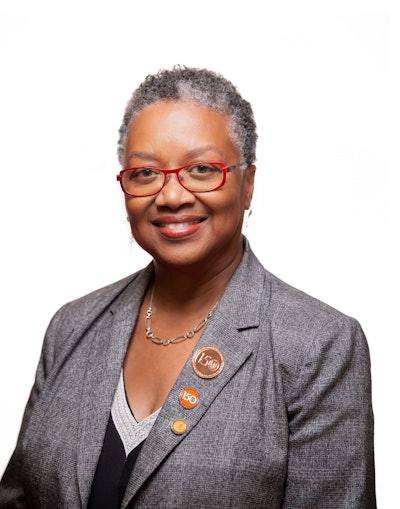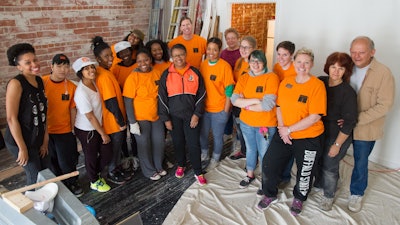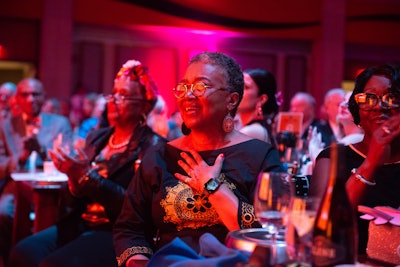Dr. Katherine Conway-Turner does her utmost to maximize the power and purpose of public higher education.
 Dr. Katherine Conway-Turner
Dr. Katherine Conway-Turner
Conway-Turner, who will retire at the end of this academic year after nine years as president of Buffalo State, has had a stellar 43-year career as a faculty member and administrator. There have been many highlights of her presidency, but she said the first thing that comes to mind are the amazing students of today and truly engaging with them.
“The issues of today are different than they have been over my life course, so it’s been a highlight to really understand, embrace and see them soar,” she said. “I believe that educated individuals need to not only lift themselves but to lift others around them. It has been part of my focus to really engage our students in civic and community work.”
During her presidency, she established a day in September called Dare to Care, during which hundreds of Buffalo State students, faculty, and staff members perform community service together. In addition, her administration has advanced civic engagement across campus with co-curricular activities and service learning.
Another highlight is upgrading facilities. In order for students to experience the best equipment and facilities while at Buffalo State, Conway-Turner, with the help of the state of New York, has been able to advance the university’s facilities. This includes a new state-of-the-art science center with a planetarium, which is now a signature piece of the campus. There has also been renovation and modernization to numerous buildings.
Engaging the university’s alumni has been deliberate. Buffalo State celebrated its 150th anniversary during her presidency, and that provided an opportunity for alumni to reconnect with each other and the institution.
“It generated excitement and investment in current programs, our students and scholarships,” she said. “We have so many first-generation students that using our alums as mentors has really been a powerful thing for our students.”
Conway-Turner said students should be prepared for the professions that currently exist, so technology has been a driving issue. Classrooms have been modernized and the campus is more technology accessible.
“We have to support the technology our students bring with them, and we also have to provide technology for students that cannot afford it or the software that they need to operate in their particular discipline is too expensive for them to have separately,” said Conway-Turner. “We have to think how we can connect with the software companies and bring an affordable way to have the software on campus.”
 Dr. Katherine Conway-Turner, center, takes part in the 2014 Inaugural Bengals Dare to Care Day.
Dr. Katherine Conway-Turner, center, takes part in the 2014 Inaugural Bengals Dare to Care Day.
In her career, Conway-Turner advanced from faculty to dean to administration. She served as a vice president for academic affairs and provost at both Hood College and SUNY Geneseo. Her desire to pursue a presidency evolved over time.
“Methodically, one step after the other, one position after the other, I got to the presidency,” she said. These steps happened as multiple people throughout her career in higher education saw her potential and encouraged her to take on additional responsibilities.
Conway-Turner was a Kellogg’s fellow, which is a leadership program with leaders from across fields. During that program, Conway-Turner met a female college president for the first time. The way the woman talked about leading got her thinking. She was subsequently an ACE fellow, a program in which individuals pursuing a presidency or other leadership position shadow a leader for part of an academic year. It was during that time she learned about facilities and cost structure, which as a faculty member she never even thought about.
Unfortunately, no programming prepared presidents for a global pandemic. Conway-Turner describes 2020 as “extraordinary” and “nothing I or any of my colleagues could have imagined.” Looking back on that time from 2020–21, she said sometimes planning and execution changed hourly to meet the needs of students, faculty and staff.
“You had to draw upon every creative sense that you had because you were making up things as you go and deciding on policies,” Conway-Turner recalled. “I’m a psychologist, but that time utilized all of my psychological understanding of fear and how people react when they are afraid for their lives and their families. Students, faculty and staff, everybody was concerned.
“It was the heaviest lift that I have ever done in my life,” she continued. “It was so important for me to be steady, clear, present and hopeful through the whole process.”
She is pleased by how everyone worked together throughout the process. Eventually, students, faculty and staff returned to campus. Then, there needed to be policies around vaccinations.
Faculty were creative in finding alternative ways for students to engage in research, said Conway-Turner. They used simulations, and social scientists used Zoom, but some delays were unavoidable.
“Not everybody’s personality was amenable to quick changes, but by and large we were able to…get them successfully to the other side,” she said.
In addition to community outreach, Conway-Turner has endeavored to get the community involved with the university. Buffalo State is an anchor institution in the Coalition of Urban and Metropolitan Universities (CUMU). She takes it very seriously that the school be deeply connected to its local community.
 Dr. Katherine Conway-Turner
Dr. Katherine Conway-Turner
She serves as co-chair of the Western New York Regional Economic Development Council and is a member of the advisory board of the United Way of Buffalo and Erie Country.
“When there are issues and concerns happening in the community, we see ourselves as a place to convene voices to talk about whatever the issues are,” Conway-Turner said. This has included bringing legislators and community members together to talk about what the city of Buffalo needs to do to address gun violence.
She’s aware that over the course of her career her presence has shown students of color what is possible. In the five institutions at which she has worked, four were predominantly white institutions. Buffalo State is a predominantly diverse institution with a minority majority student population.
“Representation has made a big difference at every institution I’ve been at,” she said. “When Black and Brown students see me as the president, it makes a difference.
“I take it very seriously to mentor women and people of color to positions of increased responsibility and authority,” she continues. “I try to provide opportunities and pathways for students, faculty and staff to know their talents. … I also try to do it on the national level.”
After her retirement, Conway-Turner plans to travel with her husband, a clinical psychologist, relocate to Maryland and spend more time with their three grandchildren. She is also determined to do something for which she hasn’t had time, learn to play a musical instrument, notably the guitar. She will also continue as a commissioner with the Middle States Commission on Higher Education.
Conway-Turner plans to write a memoir, feeling her story will be of interest to several people.
“I also want to write about leading during crisis,” said Conway-Turner. “The pandemic was one crisis. There are other crises that have occurred as well. This enrollment slip that we’re on is a crisis for higher education. I want to write about some of my takes on maneuvering through crisis. Particularly as a Black woman, people project a lot of stuff on you that is not really you. I want to write about what it was like to maneuver through difficult times and how I maneuvered through people’s projections.”





















